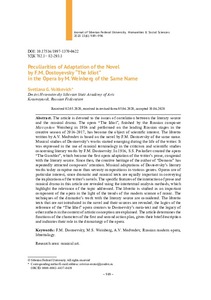Peculiarities of Adaptation of the Novel by F.M. Dostoyevsky “The Idiot” in the Opera by M. Weinberg of the Same Name
Скачать файл:
URI (для ссылок/цитирований):
https://elib.sfu-kras.ru/handle/2311/135375Автор:
Voitkevich, Svetlana G.
Войткевич, С.Г.
Дата:
2020-06Журнал:
Журнал Сибирского федерального университета. Гуманитарные науки. Journal of Siberian Federal University. Humanities & Social Sciences;2020 13 (6)Аннотация:
The article is devoted to the issues of correlation between the literary source
and the musical drama. The opera “The Idiot”, finished by the Russian composer
Mieczysław Weinberg in 1986 and performed on the leading Russian stages in the
creative season of 2016-2017, has become the object of scientific interest. The libretto
written by A.V. Medvedev is based on the novel by F.M. Dostoevsky of the same name.
Musical studies of Dostoevsky’s works started emerging during the life of the writer. It
was expressed in the use of musical terminology in the criticism and scientific studies
concerning literary works by F.M. Dostoevsky. In 1916, S.S. Prokofiev created the opera
“The Gambler”, which became the first opera adaptation of the writer’s prose, congenial
with the literary source. Since then, the creative heritage of the author of “Demons” has
repeatedly attracted composers’ attention. Musical adaptations of Dostoevsky’s literary
works today comprise more than seventy compositions in various genres. Operas are of
particular interest, since dramatic and musical texts are equally important in conveying
the implications of the writer’s novels. The specific features of the interaction of prose and
musical drama in this article are revealed using the intertextual analysis methods, which
highlight the relevance of the topic addressed. The libretto is studied as an important
component of the opera in the light of the trends of the modern science of music. The
techniques of the dramatist’s work with the literary source are considered. The libretto
texts that are not introduced in the novel and their sources are revealed; the logics of the
reference of the “The Idiot” opera creators to Dostoevsky’s meta-text and the legacy of
other authors in the context of artistic conception are explained. The article determines the
functions of the characters of the first and second action plan, gives their brief description
and indicates their role in the dramaturgy of the opera Статья посвящена вопросам взаимодействия литературного
первоисточника и музыкальной драмы. Объектом научного интереса становится
опера «Идиот», завершенная в 1986 году отечественным композитором Мечиславом
Вайнбергом и поставленная на ведущих российских сценах в творческом сезоне
2016–2017 года. Либретто написано А.В. Медведевым по одноименному роману
Ф.М. Достоевского. Музыкальная достоевистика начала зарождаться еще при
жизни писателя. Она выражалась в использовании музыкальной терминологии
в критике и научных исследованиях, касающихся литературных произведений
Ф.М. Достоевского. В 1916 году С.С. Прокофьев создал оперу «Игрок», ставшую
первым оперным прочтением прозы писателя, конгениальным литературному
первоисточнику. С тех пор творческое наследие автора «Бесов» не раз привлекало
внимание композиторов. Музыкальная достоевистика сегодня насчитывает более
семидесяти сочинений в разных жанрах. Особый интерес представляют оперы,
поскольку в них драматический и музыкальный тексты одинаково важны для
передачи глубинных смыслов романов писателя. Специфика взаимодействия прозы
и музыкальной драматургии в данной статье выявляется с использованием методов
интертекстуального анализа, что сообщает актуальность обращению к данной теме.
Либретто исследуется как важный компонент оперного сочинения в свете тенденций
современной музыкальной науки. Рассматриваются приемы работы драматурга
с литературным первоисточником. Выявляются внероманные тексты либретто,
их источники; объясняется логика обращения создателей оперного «Идиота» к
метатексту Достоевского и наследию других авторов в контексте художественного
замысла. Определяются функции персонажей первого и второго плана действия,
дается их краткая характеристика, обозначается роль в драматургии оперы

